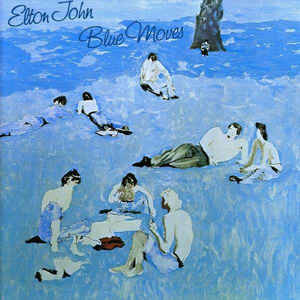
After the frantic pace of writing, recording, and touring that Elton John and company had undergone for pretty much the past six straight years, the languid Blue Moves feels like the artist forcing himself–and us–to slow down. Stretched across two discs, with most of its songs in the five-to-seven-minute range, it’s a marked contrast from the tight, pop-focused albums he’d been recording for the better part of the decade.
Blue Moves was mostly poorly received by the music press at the time, with writers criticizing its length, pacing, and its seeming self-seriousness. While its esteem has grown slightly over the years, it’s still not held up as one of his best. The album marked the end of John’s #1 record hot streak, but still sold fairly well, reaching #3 on the American charts, likely carried there on John’s lingering goodwill.
Honestly, I think those are fair criticisms, but I still found myself enjoying Blue Moves a great deal. Where John’s last double-album Goodbye Yellow Brick Road felt a bit like a well-stocked jukebox, bouncing from one style to another at a breakneck pace, Blue Moves feels deliberately slow, striking an intimate, melancholy mood and largely staying in it for 80-plus minutes. Many of its best moments are its minor-key ballads, like the eight-minute lovers quarrel “Tonight,” the stirring gospel-soul of “Chameleon,” or the aching “Sorry Seems to Be the Hardest Word,” the album’s first single and one of John’s most affecting songs.
There’s a weariness to John’s vocals that’s reflected in Taupin’s lyrics. On “Tonight,” he sings to a lover of just wanting to have a night free of argument, and “Chameleon” finds him reunited with an old acquaintance with a mixture of excitement and resignation that it won’t last long. On “Sorry…” John asks his lover straight out “what do I gotta do to make you love me?” with the exhaustion of someone who just wants to be told what to do so they can quit guessing.
Even on the more uptempo tracks like “One Horse Town,” John just sounds tired, like he’s struggling to summon the energy with which he used to deliver songs like this so easily. In general, the more rocking tracks feel a bit perfunctory, as if John conceded that they were necessary to move units but would rather be bent over his piano singing heartsick songs. He musters more enthusiasm for the swampy, horn-flecked Southern boogie of “Boogie Pilgrim,” with falsetto harmonies that sound like what Beck would use on his Midnite Vultures album 20-plus years later, and the campy female revenge romp “Shoulder Holster.” Even these tracks aren’t in much of a hurry, moving with the laid-back tempo of a humid Alabama afternoon.
Though most of the album sticks close to his usual sonic template, Blue Moves also finds John with a willingness to experiment with sounds he’s never used before. This is most evident on “The Wide-Eyed and Laughing,” built around a droning sitar line and John’s echoing recitation of Taupin’s inscrutable lyrics. It has no percussion to speak of, and it’s unlike any other song in his canon thus far.
The final side of the album begins with “Where’s the Shoorah?” with John backed by a full-on Baptist choir as he sings some more obtuse Taupin lyrics, leading into “If There’s a God in Heaven (What’s He Waiting For?),” another gospel-leaning ballad with much more straightforward lyrics, railing against the injustices of poverty and war and a higher power that would willingly send his creations to their deaths. He turns his gaze inward on “Idol,” where he looks through the lens of a star well out of his glory days. Though John was still very much in his prime at this point, it’s not hard to see this song as a reference to his own sense of fatigue and slightly dwindled popularity.
After a largely downbeat string of songs, the album ends in slightly jarring fashion with “Bite Your Lip (Get Up and Dance!),” which feels a little like John trying to rally the troops and end the evening on a more upbeat note. But despite his efforts, his command can’t help but feel a bit desperate after the largely downer album that precedes it.
John intended Blue Moves to be a transitional album, one that closed out his classic period and ushered in something new, and it does feel like a pretty apt capper to his whirlwind past six years. It’s slow and long and largely darker-hued, but its length feels purposeful. While it may have felt like a bit of a lefthand turn for the seemingly irrepressible talent seen on past albums, I can absolutely understand John wanting to try a slower pace for a while after his nonstop few years (just thinking about the relentless schedule of cranking out albums and world tours makes me want to take a nap). If you’re willing to lose yourself in John’s contemplative mood, letting its songs unfurl at their own pace, you might find a lot to like about Blue Moves.

